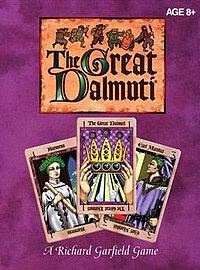
GAME DESCRIPTION: The Great Dalmuti is a card game designed for 5-8 players. The object of the game is to be the first player to get rid of all the cards in your hand. Play continues until only 1 player still has cards in their hand.
SET-UP: Each player draws a card to determine their position, from Great Dalmuti (1) to Peasant (12) with Jester (Wild) being higher than Peasant. The player with the lowest numbered card is the Greater Dalmuti, and the next player is the Lesser Dalmuti. The player with the highest numbered card is Greater Peon. The Lesser Peon is the player with the 2nd highest number. All other players become Peasants. All players sit in a circle, starting with the Greater Dalmuti. To their left sits the Lesser Dalmuti, then all the Peasants. The Lesser Peon sits to the left of the last Peasant, and the Greater Peon should be to the right of the Greater Dalmuti.
TAXATION: At the beginning of each game, the Greater Peon must give up their 2 lowest cards to the Greater Dalmuti, while the Greater Dalmuti gives 2 cards of their choice to the Greater Peon from both their starting hands. This applies to the Lesser Peon, who must only give up 1 of their lowest card to the Lesser Dalmuti, as the Lesser Dalmuti gives up 1 card to the Lesser Peon.
REVOLUTION: If any player is dealt both Jesters, then that player may shout "Revoultion", which eliminates the taxation rule. If the Greater Peon has both Jesters, they call "Greater Revolution", which has the Greater Peon and Greater Dalmuti switch places with each other, as do the Lesser Peon and Lesser Dalmuti.
PLAYING: Once everything above has been resolved, play begins. The Greater Dalmuti starts by playing any number of matching cards. The next player to the left, the Lesser Dalmuti, must either play the same number of cards at a lower value, or pass. It's at this point the Jester can be played with any card to change it's value to match the card it's played alongside. If played alone, the Jester's value is 13. Play continues for this round until everyone passes once. The Greater Peon takes all the cards away, and the player who played last starts the next round.

GOING OUT: The first player to successfully play all their cards first will, upon the next game, be the Greater Dalmuti. The next player to get rid of all their cards will take the Lesser Dalmuti position. Then all the Peasants positions are determined, with the last player to go out taking the Lesser Peon's position, and the Greater Peon being the player who failed to go out.
CONCLUSION: Great Dalmuti is a fun game with no real winner decided at the end. Sure, you can give people points decided on their position, or just whomever became Dalmuti the most, but I feel that kinda defeats the purpose. Sometimes games are played just to socialize or shut your brain off for awhile, which this one excels at with its basic rules and calming tone. Sure, expect to have players who are determined to win at all costs, but this game allows those to play alongside those people who just play for fun, not easy for a game to do. Sure, some players will feel locked out or picked on, but not game was meant for every player. Still, for a game whose playtime you can control (mostly), try The Great Dalmuti.
AFTERTHOUGHTS: So, if you've ever played Scum, President, or some variation, then this game should sound familiar to you. Your next thought may then be, "Well, why should I buy this over a pack of playing cards, which are cheaper and easier to get ahold of?" and "Why do I think in italics?" Well, I can't answer the latter, but the former is easy enough. The Great Damuti is so great (heh, easy pun) because it flows better by changing out the number of game winning cards. There are a dozen Peasant cards, the highest value card, but only 1 Great Dalmuti, the lowest card. In this case, people can't end up hoarding High cards like in Scum, because the amount has varied so noticeably. The Great Dalmuti doesn't favour the player at the top, like Scum does, but it does still make it an enviable position. 10/10 times I'd prefer Great Dalmuti over Scum.

No comments:
Post a Comment